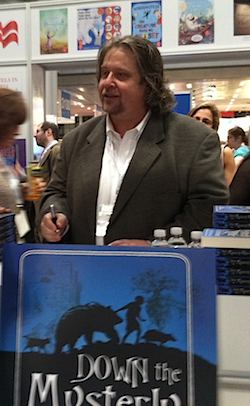Conan the Barbarian isn’t here to solve your problems.
This was perhaps one of the more interesting takeaways from Wednesday’s Bill Willingham discussion at BookExpo America. The comics writer, famed for his long-running Fables series, was there to give details on his brand new prose novel, Down the Mysterly River, debuting from Tor Books later this summer.
In regards to Conan, Willingham was being coy on the genesis of the villains in Mysterly River. (Villains that panel interviewer Heidi MacDonald of The Beat called, “truly chilling.”) Without giving too much away about the plot of the book, Willingham explained that the idea for the Mysterly River villains came from watching the Conan television show. Here was a barbarian—all muscle and anima and reaction in his movie appearances—who was now actively seeking out problems in order to rectify them. Willingham compared that to what he spoke of as the true essence of a villain: someone who thinks they know the best way to do something, and wants to enforce it on everyone around them. While Conan didn’t seem villainous, Willingham recognized how short a stone’s throw that approach was to the villains in Mysterly River.
Throughout the discussion, the subject of writing for comics versus writing for prose came up. Willingham is no stranger to prose. In fact, Mysterly River actually predates Fables, having been first created in a writing group in Texas a few years before Fables ever existed. The book itself was Willingham’s attempt to revisit Boy Scout wilderness adventure tales, a particular type story that he feels has vanished in present day books.
As opposed to his successful comic epic, though, the author readily admitted that prose takes more ongoing commitment. Willingham discussed going through an extensive rewrite of his original draft of Mysterly River, tightening up the text, patching up plotholes or lacking character motivations, adding chapters, and even adding an entirely new character viewpoint*. (One audience member in the panel likened this to hell, which Willingham was happy to say he avoided this time around, simply because of how the new character interacts with the existing plot.)
*This won’t make sense until the book hits the shelves, but for those finding this article months later, the new character viewpoint is a fellow Willingham refers to as “Green Jack.”
One of the more intriguing storytelling muscles that Willingham found himself having to develop for Mysterly River was a radically different take on exposition. In comics, the author noted, exposition is visual. You relay it in a purely technical sense, as panel structure and setting that the artist must then translate.
This strength in comics writing doesn’t translate into prose, where exposition must be carefully, and very much artistically, layered in to the tale. Strength in writing comics dialogue, Willingham found, translates readily to prose, but exposition became an entirely new struggle. Whereas in a comic script, he can expound on the details of a setting, in prose he needed to find the most effective away to say as much as possible in as little space as possible.
The subject of a Mysterly River sequel came up, as well. And while the author was coy in this regard, he did mention that he sees the world of Mysterly as a lot like Fables. In Fables, stories end all the time and characters come and go, but the larger tale is never over. Willingham would like to revisit Mysterly River in the same manner.
The author had to rush off to a signing, but did have one more fun fact for us: He really likes the name “Max.” See how many time you can find it in his works!
Chris Lough is the production manager of Tor.com and is wandering around BEA as you read this. Yes, still. Please help.










